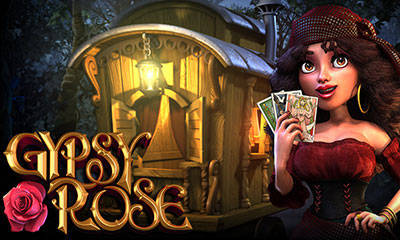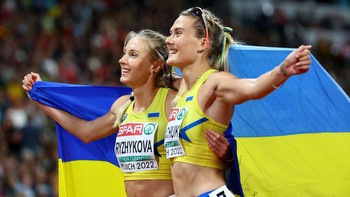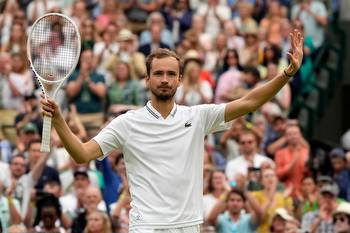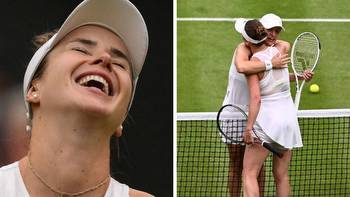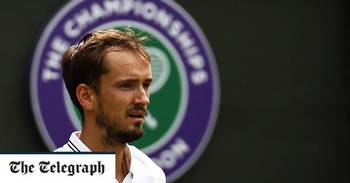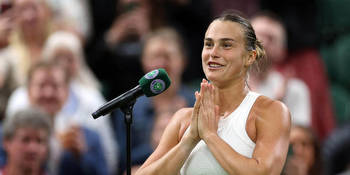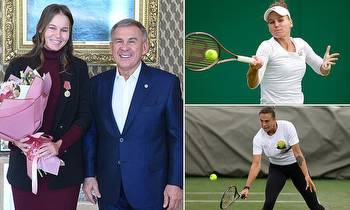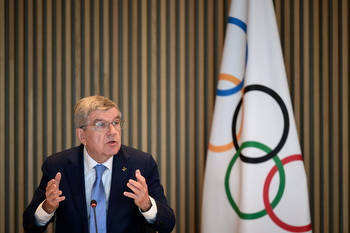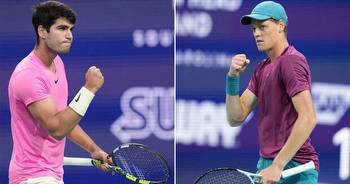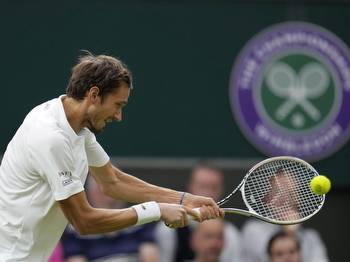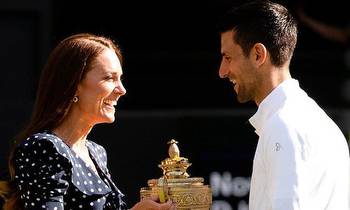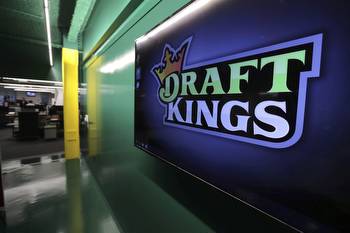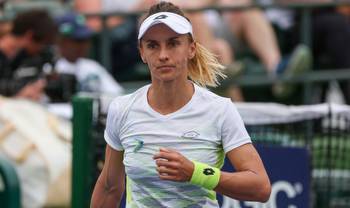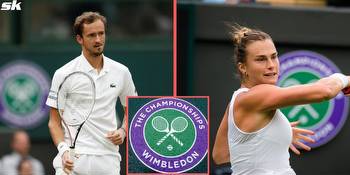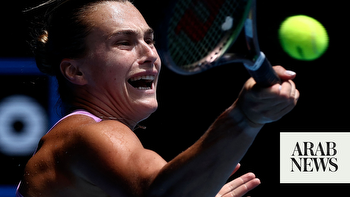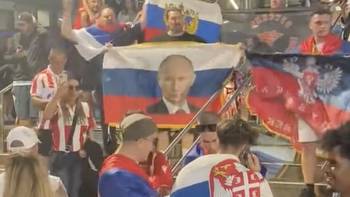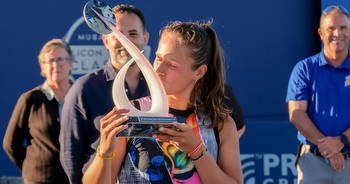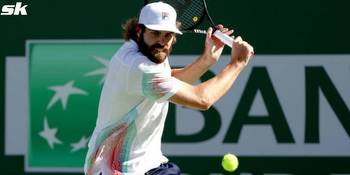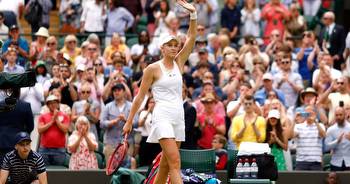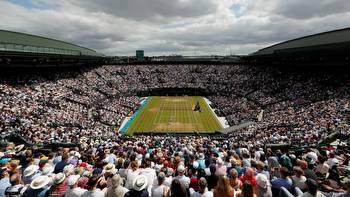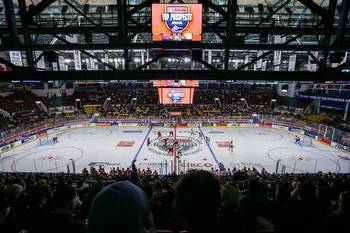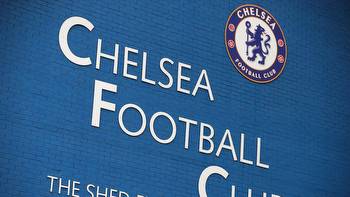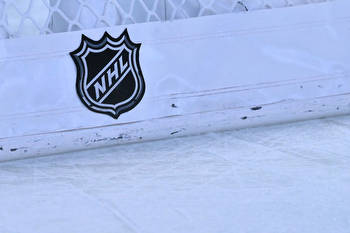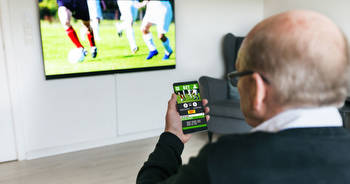How Wimbledon has reacted to the return of Russian and Belarusian players
If you would like to follow The Athletic’s Wimbledon coverage, .
You won’t often hear booing at Wimbledon — the most likely reason is when rain stops play.
And yet no one quite knew how the return of Russian and Belarusian players, while the war in Ukraine continues, would go down with the crowd.
Monday morning brought an early litmus test when Andrey Rublev stepped on court. The Russian was greeted amicably and left to a standing ovation.
The atmosphere might not be so warm, however, in the confines of the locker room. The Athletic understands there has been frostiness between players from Ukraine, Russia and Belarus at tournaments in recent months, while players from other nations have suggested Russian and Belarusians should have been made to publicly denounce the war before being allowed to compete here.
Under pressure from the UK government last year, the All England Club banned players from those nations from taking part in response to Russia’s invasion of Ukraine. It was a decision supported by many Ukrainian players, but plenty within tennis were critical of it, particularly when it was at odds with the stance of the International Tennis Federation (ITF) and men’s and women’s tours, as well as the other three grand slams, which all allowed Russians and Belarusians to compete as neutral athletes.
Wimbledon had gone out on a limb and were punished for it. The tournament’s ranking points were removed, meaning performances at the tournament would not count towards a player’s world ranking, and Britain’s Lawn Tennis Association were fined $1million by the ATP (Association of Tennis Professionals) and $750,000 by the WTA (Women’s Tennis Association).
In March of this year, the All England Club revoked the ban — which led the WTA to halve their fine.
Eighteen players from those nations entered this tournament — six in the men’s drawand 12 in the women’s — the most high-profile of which are Daniil Medvedev (Russia) and Aryna Sabalenka (Belarus), who are both grand slam champions elsewhere.
In order to compete, those 18 players had to sign personal declarations agreeing to compete in the tournament as neutrals and to not make statements supporting the war or the regimes involved in it. Another stipulation was that they would not receive any financial assistance from either nation or state-supported businesses.
World No 3 Medvedev was full of charm on Saturday, describing Wimbledon as the best tournament in the world.
“The first day you come, it was the same for me in juniors, you’re like, ‘Wow, that must be the best place in the world’,” he said. “Every flower seems to be in the right order, the right colour. The locker rooms are unbelievable. The food is great. I mean, the atmosphere around the site itself, the first day you always say, ‘Wow, that’s the best tournament’.”
Sabalenka is one of the favourites to win the women’s singles and brushed past Panna Udvardy, of Hungary, in 62 minutes on Centre Court on Tuesday. She was given a warm reception and there were plenty of cheers after a comprehensive win.
Speaking on court after, she said: “I didn’t realise how much I missed this place until this match. Thank you everyone for coming and supporting, it really means a lot to me. Thank you.
“It was a great match. I was just trying to do my best. I was enjoying the atmosphere, enjoying the game. I missed this place a lot, I think that’s why I played my best tennis today.
“I feel great. I’m feeling good. It is really good to be one of the favourites in this beautiful tournament and I will do my best to see if I can get as far as I can here in Wimbledon.”
Do not expect to hear her mention the war, though. The world No 2 announced before the tournament that she would not address questions on politics after being repeatedly grilled about the Belarusian leader, Alexander Lukashenko, by a journalist at Roland Garros.
Sabalenka has been pictured in the past with Lukashenko, a firm ally of Russian president Vladimir Putin. When pushed if she supports Lukashenko, she said: “It’s a tough question. I don’t support war, meaning I don’t support Lukashenko right now.”
She skipped the post-match questions in Paris twice after that, saying the exchange with the reporter had made her feel unsafe.
In her pre-Wimbledon press conference on Saturday, the 25-year-old said: “Before we continue, I would like to say I’m not going to talk about politics. I’m here to talk about tennis only. Please respect that. If you have any kind of political questions, you can ask WTA or the tournament. They can send you the transcript of my answers from the previous tournaments.”
Others, such as Rublev and Daria Kasatkina (both Russian), have confronted the topic head-on since the war started in February 2022.
Rublev, the seventh seed here, was the first Russian back on court at Wimbledon. He was also one of the first Russian players to speak out against the invasion of Ukraine last spring.
On his way to winning the Dubai Tennis Championships in February 2022, Rublev wrote “No War Please” on the lens of one of the on-court cameras after his semi-final win against Hubert Hurkacz. He reiterated his anti-war stance this year at the same tournament.
The 25-year-old was greeted with warm applause on No 3 Court, where he beat Max Purcell in straight sets to reach the second round. Afterwards, he said he was glad to be back, though repeated his belief that the organisers had “better options” last year when they put the ban in place.
“I feel really happy to be back because I didn’t play much Wimbledon, or I was injured, or there was the pandemic, or then they ban us,” he said. “So, of course, it feels really special and I feel really happy to be back in London to play at one of the best tournaments. To get a win today was a nice moment.”
Speaking about the ban, he said: “If we really want to help or do what is better for tennis and for people, I think obviously there were better options. Not just to ban (us) because in the end (it made) no difference. They (Wimbledon) did only worse to themselves.
“For sure, there were options to do much better for everyone (in the past he has suggested all prize money by Russian and Belarusian players should be donated to charity), but it is what it is. Now we are here and, like I said, I’m really happy to be back and to compete.”
Kasatkina, the world No 10, has gone to great lengths in public to reiterate her opposition to Russia’s actions. In July last year, she gave a video interview to the Russian blogger Vitya Kravchenko in which she criticised the war and came out as gay — speaking out against attitudes towards homosexuality and restrictions on LGBTQ+ rights in her home country. The interview finished with Kasatkina in tears at the prospect of not being able to return to Russia in the future because of her sexuality.
At the French Open earlier this year, Elina Svitolina, the Ukrainian world No 76, said: “I’m really thankful for the position that she (Kasatkina) took. She’s a really brave person to say it publicly, that not so many players did.”
And then last week at Eastbourne, one of the warm-up grass events before Wimbledon, Kasatkina was hugged by a spectator for her bravery.
“I want to be able to respect myself when I look in the mirror and if being a good person means I have to sacrifice my home, that’s my choice,” she told The Sunday Times shortly before Wimbledon. “That person hugging me (in Eastbourne) meant a lot because it was a big risk for me to condemn the war, especially considering my parents are still there, but I couldn’t just stay silent and pretend everything’s OK.”
“It’s unsafe for me now with the regime we have — as a gay person who opposes the war, it’s not possible to go back.”
She said she did not regret her decision “even 1 per cent” to give that interview and that the outbreak of war had made her feel overwhelmed and determined not to hide who she was.
Victoria Azarenka (Belarus) has twice reached the final at Wimbledon and beat Yue Yuan early on day one. She said afterwards that she did not know how she’d feel on her return to SW19.
“I don’t know if we can be fully like, ‘Let’s move on and forget about everything that happened (referring to the ban)’,” Azarenka told The Athletic. “I think that’s going to take a little bit of time to do that and we have to be sensitive to what’s going on in the world.
“However, in the moment, I have to be able to do my job. That’s why I’m here. People come here to watch tennis. The two weeks here, it becomes a completely different place. When I was practising in the last two weeks, I’ve been anticipating, ‘Oh, I don’t know how it’s going to feel’. I didn’t really feel anything besides being excited. I’m here, I’m playing. It’s been very tough personally to keep my head present and focus on myself — at least while I’m on the court — but I hope I’m going to be able to do that while I’m here because it’s not easy to deal with a lot of things that are going on in the world.”
Veronika Kudermetova, the Russian 12th seed who beat Estonia’s Kaia Kanepi in straight sets, said some Ukrainian players ignore her in the locker room.
“I say hi to them,” she said. “I say hi. Some people, they reply; some do not. Like others, I just say here we are just a tennis player. It’s like that.
“The crowd was very good for me. They support me. I think it doesn’t matter from which country you are, we are here as just tennis players. We are here to compete and try to show our best.”
At recent tournaments, players from Russia and Ukraine have been seen staring at their phones to avoid acknowledging each other.
There is a definite awkwardness between players from those nations and some event organisers have purposefully kept them away from each other behind the scenes.
Asked on the first morning about the return of players from Russia and Belarus, the chief executive of the All England Club, Sally Bolton, said: “It’s the right decision for the championships this year. All of those athletes are competing as neutrals, they’ve all signed the declaration.”
Fans cannot bring Russian or Belarusian flags into the grounds and none of the broadcast pictures from Wimbledon will be shown in either country and no merchandise will be sold there.
During her win on Monday, the women’s world No 1, Iga Swiatek, wore a ribbon on her cap with the colours of the Ukraine flag in a show of solidarity for the victims of the war.
The tournament organisers have assisted Ukrainian players with accommodation and practice facilities during the grass-court season and have invited refugees from the country to the tournament.
Wimbledon are donating a pound from every ticket sold during the fortnight to support Ukraine, via the Red Cross, which should amount to a sum of around £500,000.
Some players think Wimbledon did not go far enough, believing the Russian and Belarusian players are saying what people want to hear and that behind the scenes they are supportive of the invasion of Ukraine.
Speaking last month to The Athletic, Barbora Krejcikova, the No 1 seed in the women’s doubles at Wimbledon and a former French Open singles champion, said: “I feel that there are players that secretly support it (Russia’s invasion of Ukraine). They support it just because it’s their country. So they support what’s happening there. And… it’s just not public. And then I know that there are some players that are trying to get away from that and trying to just even publicly tell you what they think and how they feel (such as Rublev and Kasatkina).
“Politics and sport — you can’t separate it. It’s always going to be connected together.”
Barbora Strycova, the Czech doubles specialist and one-time Wimbledon singles semi-finalist, told The Athletic before Wimbledon that players from those nations should have had to sign something publicly to say they are against the invasion of Ukraine before they were granted permission to play.
“I would let them (the Russians and Belarusians) play, but I also would like to know how they feel,” she said. “And have them sign something that they are against the war. Then we have a clear answer. We know they are against it.
“Sabalenka didn’t go for the press conference, which was, for me, it was kind of like, ‘I think you should go. You should be talking about it. We should hear from you. You are a star and we should hear your opinions’.”
While the highest-ranked Ukrainian men’s player, Oleksii Krutykh (world No 182), lost in the first round of qualifying, there are five women in the top 100 and all were present at Wimbledon. They have frequently voiced their opposition to Russia’s invasion and the treatment of their compatriots, detailing the awful situations that many of their relatives find themselves in back in Ukraine.
Speaking before the tournament, world No 26, Anhelina Kalinina, told The Athletic: “It’s not hard to answer questions (about Russia’s Wimbledon ban). It’s hard talking with my family. For me, the toughest thing is when I call my mother, my father, my brother, my grandparents. They are living in a horrible, horrible situation and this is what’s horrible — not me sitting in Britain playing tennis on grass.
“Thank god I can enjoy this beautiful sport. But people there, they’re basically trying to survive and that’s what matters, not what’s happening here. We’re fighting on our own field for our country. In Ukraine, the soldiers are doing their bit and fighting for us. We’re blessed to have them and so much support. Ukrainians are united in this way.”
Kalinina plays Jessica Bouzas Maneiro, of Spain, in the first round on Wednesday.
Her compatriot Svitolina beat Venus Williams in straight sets on Centre Court on Monday and spoke afterwards about her family back home in Ukraine and how they are constantly in her thoughts.
“When I wake up, I always check the news. Every moment that I’m not on the court I’m checking how my family is doing, how the situation is in Ukraine, monitoring all the time what is happening and how me and my foundation, the team around me, how we can help in that particular moment for some kids, for my family, for friends, for anyone.
“So this is pretty much the life I have now on a day-to-day basis.”
The Elina Svitolina Foundation was established in 2019 to help talented tennis players in Ukraine fulfil their potential. The war has stopped their work in that country, so for now, the foundation is supporting young tennis players who have left Ukraine and are living around Europe, providing accommodation, food and training.
“My dad goes back and forward travelling. My grandmother stays there. She’s over 85 years old, so it’s difficult for her to travel. Her health is not good enough to go out of Ukraine. She loves home. It would be impossible for her to leave the city, even.”
It should not be forgotten that when the war began, three of Ukraine’s greatest-ever men’s players were quick to sign up to defend their country.
Two months after retiring from the sport, Sergiy Stakhovsky, who beat Roger Federer here 10 years ago on Centre Court, had joined the Ukrainian forces. Soon after, Andrei Medvedev, a 1999 French Open finalist, and Alexandr Dolgopolov, a former top-15 player, had done the same.
“Last year, Wimbledon showed great bravery,” Stakhovsky told The Observer last week. “They were pioneering in terms of what should be right and what should be wrong. Unfortunately, they didn’t find any support within their own ranks. I’m talking about grand slam tournaments.”
Rain played havoc with the second day at Wimbledon, but six of the eight Russian and Belarusian players that have completed their first-round matches are into the next round. Ten more will, weather permitting, get their chance on Wednesday.
Two Russians will take centre stage at lunchtime. Kasatkina faces British hopeful Jodie Burrage in the first match on Centre Court, while Medvedev opens on No 1 Court against another Brit, Arthur Fery.
(Additional contributor: Nick Miller)
